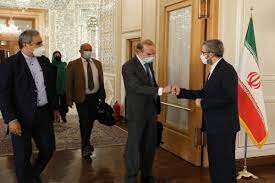EU’s Mora may return to Tehran in fresh push to resurrect nuclear deal

TEHRAN - European officials are preparing to make a fresh push to salvage a nuclear deal with Iran, offering to send Enrique Mora, the European Union coordinator of the negotiations, to Tehran, according to Western diplomats.
The talks in Vienna to revive the nuclear deal, officially known as the JCPOA, have hit a deadlock as Washington refuses to lift terror designation on Iran’s Islamic Revolution Guards Corps (IRGC).
According to the Wall Street Journal, Mora has told Iranian counterparts he is ready to return to Tehran to open a pathway through the deadlock.
So far, Iran hasn’t responded with an invitation, the diplomat added.
Mora first visited Tehran in late March. During his visit he held talks with Iran's chief nuclear negotiator Ali Bagheri Kani and Foreign Minister Hossein Amir Abdollahian.
Meanwhile, Western officials have largely lost hope the JCPOA can be resurrected, sources familiar with the matter have said.
While they have not completely given up on the pact, under which Iran restrained its nuclear program in return for termination of economic and financial sanctions, there is a growing belief it may be beyond salvation, Reuters reported on May 2.
"They are not yanking the IV out of the patient's arm ... but I sense little expectation that there is a positive way forward," said one source, who like others quoted spoke on condition of anonymity because of the issue's sensitivity.
Four Western diplomats echoed the sentiment that the deal - which Iran struck with Britain, China, France, Germany, Russia and the United States in 2015 but which then-U.S. President Donald Trump abandoned in 2018 - is withering away.
The pact appeared on the brink of revival in early March when the EU, which coordinates the talks, invited ministers to Vienna to seal the deal. But talks were thrown into disarray over last-minute Russian demands and whether Washington might remove the Islamic Revolution Guard Corps (IRGC) from its Foreign Terrorist Organization (FTO) list.
The Russian demands appear to have been finessed but the IRGC designation has not, with the impending Nov. 8 U.S. mid-term elections making it hard for U.S. President Joe Biden to buck domestic opposition to remove it.
Biden's aides have made clear they have no plans to drop the IRGC from the list but have not ruled it out, saying if Tehran wants Washington to take a such step beyond strict revival of the deal, then Iran must address so-called U.S. concerns outside the deal.
"If they're not prepared to drop… demands, continue to insist on lifting the FTO, and refuse to address our concerns that go beyond the JCPOA then, yes, we're going to reach an impasse that is probably not going to be surmountable," said a senior U.S. official.
"Is it dead? We don't know yet and frankly we don't think Iran knows either," the official said.
So far, Iran seems unwilling to budge on the FTO removal.
The Trump administration put the IRGC on the FTO list to make it harder for the next administration to return to the JCPOA.
"That is our redline and we will not cave on that," said an Iranian security official.
In talks with Irish Foreign Minister Simon Coveney on Tuesday, Iran’s Foreign Minister Amir Abdollahian urged the current U.S. administration to present “political initiatives” and “correct” Trump’s “illegal behavior” in order to revitalize the JCPOA.
Despite talk of a U.S. "Plan B" to address Iran's nuclear program if the deal cannot be revived, there are few good options.
Iran has been saying with or without a revival of the JCPOA it has no intention to build nuclear arms.
The main lever big powers have is to cut Iran's oil exports.
While Washington won the tacit support of Moscow and Beijing to curb Iranian exports via U.S. sanctions in the years before the 2015 deal, there is no such consensus among the big powers.
Russia's invasion of Ukraine despite U.S. and European warnings show Moscow's assent cannot be taken for granted.
China is the chief buyer of Iranian oil and the sources said getting it to cut back will be tough when oil supplies are tight.
Asked previously about its purchase of Iranian oil in violation of U.S. sanctions, China's Foreign Ministry has reiterated Beijing's opposition to U.S. extraterritorial sanctions and urged the United States to remove its unilateral sanctions.
Iranian oil exports rose in the first quarter to an average of 870,000 barrels per day, according to Kpler, which tracks oil flows, up from 668,000 bpd in the fourth quarter.
The United States would, in effect, have to manage one effort to cut Russia's oil exports and another to slash Iran's.
"Can you galvanize two sanctions coalitions at once? That's tricky," said another source, saying Iran is now selling about half the volume of oil that it could sell if U.S. sanctions were removed but, because of the price rise, pocketing the same revenue.
"(Why should Tehran) make a painful concession when they're basically already getting that oil benefit?" he said.
Leave a Comment